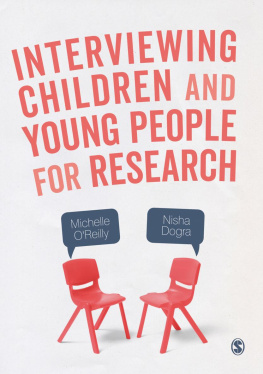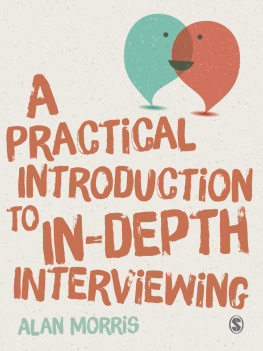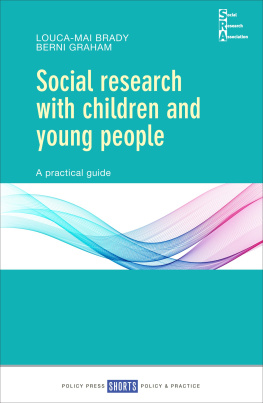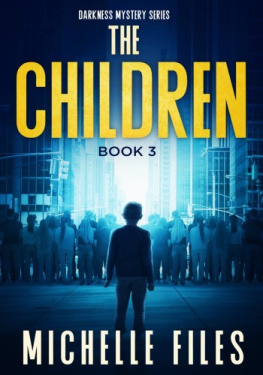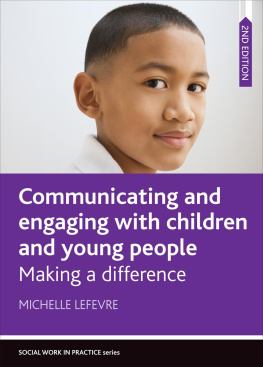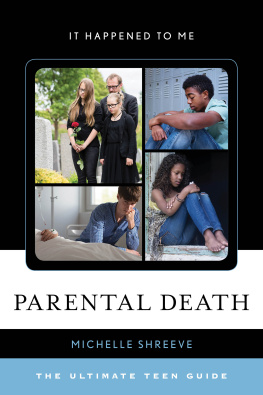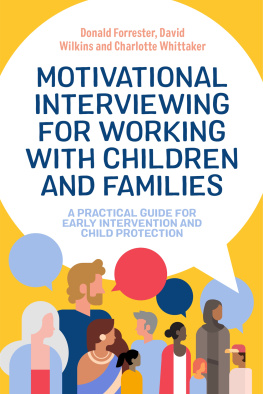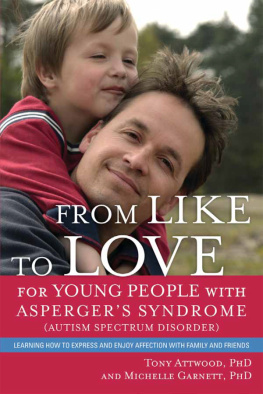Interviewing Children and Young People for Research
Interviewing Children and Young People for Research
- Michelle OReilly
- Nisha Dogra
SAGE Publications Ltd
1 Olivers Yard
55 City Road
London EC1Y 1SP
SAGE Publications Inc.
2455 Teller Road
Thousand Oaks, California 91320
SAGE Publications India Pvt Ltd
B 1/I 1 Mohan Cooperative Industrial Area
Mathura Road
New Delhi 110 044
SAGE Publications Asia-Pacific Pte Ltd
3 Church Street
#10-04 Samsung Hub
Singapore 049483
Michelle OReilly and Nisha Dogra 2017
First published 2017
Apart from any fair dealing for the purposes of research or private study, or criticism or review, as permitted under the Copyright, Designs and Patents Act, 1988, this publication may be reproduced, stored or transmitted in any form, or by any means, only with the prior permission in writing of the publishers, or in the case of reprographic reproduction, in accordance with the terms of licences issued by the Copyright Licensing Agency. Enquiries concerning reproduction outside those terms should be sent to the publishers.
Library of Congress Control Number: 2016940066
British Library Cataloguing in Publication data
A catalogue record for this book is available from the British Library
ISBN 978-1-4739-1453-7
ISBN 978-1-4739-1452-0 (pbk)
Editor: Jai Seaman
Editorial assistant: Alysha Owen
Production editor: Ian Antcliff
Copyeditor: Christine Bitten
Proofreader: Thea Watson
Indexer: Martin Hargreaves
Marketing manager: Sally Ransom
Cover design: Shaun Mercier
Typeset by: C&M Digitals (P) Ltd, Chennai, India
Printed in the UK
About the Authors
Dr Michelle OReillyis a Senior Lecturer for the Greenwood Institute of Child Health, at the University of Leicester, working for the School of Media, Communication and Sociology, and the School of Psychology. Michelle also provides research support to practising clinical professionals working for Leicestershire Partnership NHS Trust. Michelles research interests are broadly in the areas of child mental health, psychiatric research, family therapy and qualitative methods, and she has a particular research interest in Autism Spectrum Disorder, having recently edited a special section in the
Journal of Autism and Developmental Disorders. Michelle has recently edited two handbooks (with Jessica Lester)
The Palgrave Handbook of Child Mental Health and
The Palgrave Handbook of Adult Mental Health. For more details please consult: https://www2.le.ac.uk/departments/npb/people/michelleOReilly.Professor Nisha Dograis Professor of Psychiatry Education and Honorary Consultant in Child and Adolescent Psychiatry, at the Greenwood Institute of Child Health, University of Leicester. She is also Course Director for the Masters in Child and Adolescent Mental Health. She undertook some training in hospital and community paediatrics before training in psychiatry and then as an academic child psychiatrist. She currently works as a generic child and adolescent psychiatrist within a multi-disciplinary team (MDT). She has been involved in the development and delivery of a wide variety of teaching and training events in undergraduate and postgraduate education, locally, nationally and internationally. Professor Dogra worked on diversity in healthcare as part of her Commonwealth Fund Policy for Health Care Harkness Fellowship 20052006. She was a runner up for the Times Higher Education Innovative Teacher of the Year 2011. For more details please consult: https://www2.le.ac.uk/departments/npb/people/nishaDogra.
Acknowledgements
We would like to offer our appreciation to several people who have helped to make this book happen. We thank the anonymous reviewers for their suggestions to develop areas within the book and all of their ideas. Of course we thank our families for their personal support during the process of writing, for their patience and understanding. Finally, we thank SAGE, for facilitating this book from inception to publication, particularly Jai Seaman and Alysha Owen.
Abbreviations
- AMA = American Medical Association
- BSc = Bachelor of Science
- CA = Conversation Analysis
- CAMHS = Child and Adolescent Mental Health Services
- DA = Discourse Analysis
- DP = Discursive Psychology
- DVD = Digital Versatile Disc
- IPA = Interpretive Phenomenological Analysis
- IQ = Intelligence Quotient
- IRA = Irish Republican Army
- NSPCC = National Society for the Prevention of Cruelty to Children
- SRA = Social Research Association
- UK = United Kingdom
- UN = United Nations
- UNCRC = United Nations Convention of the Rights of the Child
- USA = United States of America
Preface
Interviewing is considered to be the most popular form of qualitative data collection and many researchers choose to use this to learn about peoples lives. Many, if not most, of the qualitative approaches argue that there is value in the interview for gaining an understanding of peoples opinions, experiences and feelings about particular phenomenon. Furthermore, some quantitative researchers use the interviewing method to gain structured information from participants. While not without criticism, the use of interviews in research is growing and is commonly taught on research methods programmes on undergraduate and postgraduate training courses, as well as on vocational training courses for practitioners in various areas of practice, including education, social care, health and medicine.
This book is designed to take the reader through the whole process of undertaking a research project with children and/or young people using interviewing. The book is an accessible and practical guide for the reader and is designed to help students, practitioners, researchers and academic scholars in designing, planning, undertaking and analysing their interview study with children and young people. This is a timely text as there is a vast literature on interviewing as a technique for collecting data, and the literature on using this method of data collection with children and young people is expanding. However, while there are general textbooks to guide research with children and there are general textbooks on interviews, the focus on interviewing children and young people in one resource is up to now limited.
Definitions
In this book there are a range of terms used. Generally, we use the pronoun we throughout the chapters to identify us as the authors of the book, and use you to refer to the person reading the book. This book is about interviewing children and young people and we use a range of terms where appropriate to refer to this group. Generally, we use the term children to refer to populations who are under the age of 18 years old. We use the term young people to refer to those in their teenage years, and we use the term adolescents when being more technical. Throughout the book we refer to the parents and guardians of the children and generally use the term parents throughout to encompass all adults who have legal responsibility for children including biological parents, foster parents, adoptive parents, step-parents, local authorities, carers and other legal guardians.





